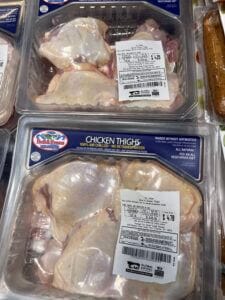
Publix grocery shoppers may soon get some clarity about allergen cross-contact risk for packaged fresh meat and seafood.
In late March, Allergic Living published an article about Publix having introduced widespread cross-contact risk warnings on packaged fresh meat and seafood. The labels were even applied on fresh meats prepackaged by other suppliers. Some of these bore manufacturers’ labels as dairy-free or gluten-free.
Customer Meredith Smith, who alerted Allergic Living to the practice, says that report got attention. She received a call from a Publix quality assurance representative informing her that prepackaged meat that a manufacturer clearly labeled to be free of allergens would no longer bear a Publix blanket allergen advisory.
“I’m very thankful that Publix recognized that such labeling negatively impacts customers,” Smith told Allergic Living.
Publix did not respond to Allergic Living’s requests for comment. However, Smith was told it could take until September to change the allergen warning labels at Publix’s 1,300 stores. She says the representative indicated the change follows an internal Publix meeting.
Smith had alerted Allergic Living after finding the new precautionary allergen labels on fresh meat, poultry and seafood. They read: “Our department uses eggs, fish, milk, peanuts, sesame, shellfish, soy, tree nuts and wheat.”
The allergen warnings concerned Smith, who avoids buying food with a potential for cross-contact for her teen daughter Kendall. Because of the uncertainty about whether the meat would be safe for Kendall’s peanut allergy, Smith began shopping elsewhere.
The cross-contact allergen statements were especially confusing on products that were packaged by other suppliers. Publix shoppers like Smith were left to wonder which label to believe regarding top allergens.
Other Supermarkets’ Allergen Cross-Contact Labels
Allergen warning labels have made customers pause when shopping at other supermarkets, as well. When Allergic Living raised the issue about allergen cross-contact statements on Publix foods, readers relayed stories about encountering similar labels.

For example, a shopper in Vermont began shopping at a different grocery store after finding the same type of allergen advisory labels at Shaw’s, a supermarket in New England.
Shoppers in the Chicago area noticed allergen warning labels on Whole Foods Market’s brand of meat and seafood. One reader said she stopped buying seafood from Whole Foods because of the precautionary labels, while another was deterred by the allergen label on fresh turkey.
I did some of my own shopping research. I found a Whole Foods location north of New York City has warning labels on Whole Foods’ brand fresh meat, poultry and seafood. They read: “May contain allergens due to shared production areas.” The same labels also appear on some packages of meat from other suppliers.
Whole Foods also did not respond to Allergic Living’s request for clarification of its labeling practices.
Lack of Allergen Cross-Contact Guidance
Whole Foods is no stranger to allergen labeling issues. The retailer came under fire from the FDA in December 2020 over a string of allergen recalls. The agency issued a warning letter to Whole Foods for selling 32 products in one year that were misbranded under Section 403 of the federal Food, Drug, and Cosmetic Act. The recalled products (mostly from the deli and bakery sections) did not clearly say when they contained any of the top allergens.
The Whole Foods website addresses its allergen labeling policy for its 365 Everyday Value and Whole Foods Market brands. It says allergens “will be called out by their common or usual name on the label, as required by law.”
The FDA requires the top 9 allergens to be clearly labeled on packaged foods under the Food Allergen Labeling and Consumer Protection Act (FALCPA). But FALCPA does not cover meat and poultry. The USDA, not the FDA, regulates those products. Neither government agency offers guidance to the industry on “may contain” allergen advisory labels.
Hope for Change at Publix
With no regulations directing allergy advisory labels, grocery shoppers are left to try to decipher the precautionary allergen warnings. While this has long been an issue in deli and bakery departments, the supermarkets seem to be spreading the blanket labels to meats, poultry and seafood.
Smith’s experience trying to determine the meaning of the allergen labels, along with alerting Publix of the effects for food-allergic consumers, was no small feat. She visited various Publix stores on Florida’s east coast, and made several calls and emails to Publix and food manufacturers.
“It’s unfortunate that as a community we still face so much inaccurate and frankly lazy food labeling,” says Smith, whose home is in Rochester, New York.
She would like to return to the Publix stores that she previously frequented during Florida stays for her daughter’s tennis training. The allergy mom hopes to see labels that accurately reflect cross-contact risks the next time she shops for meat at Publix.
“I believe that, in the end, Publix will follow through with their promise to fix these labels and do the right thing,” she says.
Related Reading:
FDA Food Code Calls for Allergen Labeling for Dining, Delis, Bakeries
Bread Suppliers ‘Adding Sesame’ as Seed Becomes Top Allergen
USDA vs. FDA Food Labeling
How to Read a Label When You Have Food Allergies





